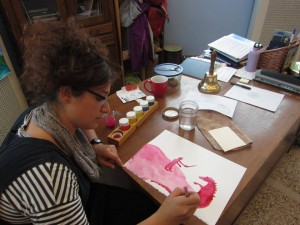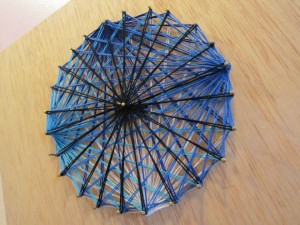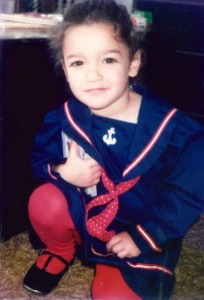Sarina Yospin first encountered Waldorf kids one summer while working at Journey’s End Farm Camp. She noticed something different about the young people who attended Waldorf schools right away. “They’d be walking around singing rounds or they’d bust out their violins and cellos and just start playing. They were just so much freer than kids often are, and it planted a seed in the back of my mind that I would wish to teach that way someday.”
After graduating with honors from Carleton College with a license to teach 7-12 grade Science, Ms. Yospin taught in schools all over the metro area. She taught in St. Paul, at the Bakken Museum, then Outdoor Education at Eagle Bluff Environmental Learning Center, and high school science in Hopkins. “There was something missing, so I kept moving around. I think I was collecting things I hoped to put together somehow,” she says.
As she put together sample lessons for her second interview at City of Lakes Waldorf School, she realized that she was suddenly able to incorporate all the things she loved to do- science, math, movement, story, music- it all came together. She sensed new possibilities for her teaching life. “Before, it was, I dance, but who cares- I’m just a science teacher. With this job, you really have to bring it all.”
“Right before I went to my first teacher training, [Grade 5 teacher] Darcie Steeves wrote me an email that said ‘Welcome to Waldorf. Prepare for your heart to crack open into a thousand tiny pieces.’ And then I went to training and realized, she’s right.”
“In all of these different places I’ve taught, and in mainstream teacher training, it’s not so much about loving the child, and that was so obvious and clear in every Waldorf class that I took. I just thought, ‘Oh! That’s what I’ve been missing. That’s why it wasn’t working!’ There is so much tightness in mainstream education right now, it’s just really hard to find that love and feel welcome to share it with the children. “
She immediately sensed that a Waldorf teacher has to draw on every part of themselves. That was what her colleague, Ms. Steeves, had been talking about. “You have to bring all of yourself to everyday. That’s what makes it hard, but that’s what makes it life-giving and fun, and I had been holding back a lot of different parts of myself from all these different teaching settings. Here as a teacher I have to also be a singer and a songwriter and a potter and a painter and an actor and a friend and a mom. All these things, I have to bring it all in!”
 At mainstream teacher training sessions, Sarina remembers a palpable reluctance to be there- from many. ” It was, ‘Can we make this quick? I got things to do.’ And you’re not even paying attention when you’re there, you’re just waiting for it to end.” The contrast at Waldorf teacher training was striking. She noticed that everyone was inspired and delighted to share that inspiration with their colleagues.
At mainstream teacher training sessions, Sarina remembers a palpable reluctance to be there- from many. ” It was, ‘Can we make this quick? I got things to do.’ And you’re not even paying attention when you’re there, you’re just waiting for it to end.” The contrast at Waldorf teacher training was striking. She noticed that everyone was inspired and delighted to share that inspiration with their colleagues.
Ms. Yospin feels that enthusiasm comes from the strong emphasis Waldorf education places on the whole human being. The more well-rounded a teacher is, the more well-rounded the students. “The teacher development in Waldorf education seems to be about encouraging inspiration on a much larger level, because if you get the big picture, the smaller stuff starts to bubble up. And in my experience, in mainstream training, the smaller things are the focus, and it burns people out. And you don’t even get to the part about ‘Why are you doing this? Because you love children!’ “
Discovering how to pour love into her classroom and her students unlocked her gifts as a teacher, and it is why she is thrilled to be leading her class in their sixth grade year. “I am excited to deepen my relationship with my students. Even after just one year, I teach every kid differently because I know them all now and I know they each need something different.”
She’s noticed a strong bond in her class. Each student has a special understanding of their classmates. “There is a more familial feeling, of: This is our group and we’ve got each other’s backs.” The safety and comfort created by this close camaraderie means they can focus on the work at hand.
To meet the developmental needs of a sixth grader, who is interested in the clear delineation of law and order, black and white, right and wrong, the social studies and history curriculum centers on Ancient Rome and Greece. There is also a heavy emphasis on mathematics. “Sixth graders are all about ‘We’re in charge now’,” she says. ” They are ambitious and want to follow the rules and just ascend.” The students are currently working on a business project to help them understand how to calculate percentages.
“The business project deals with a lot of percentages, but also emphasizes productivity, cooperation and efficiency. Half the class is making candles and the other half is making playing cards. They have to design the whole thing and calculate the cost of materials. Then they need to apply to their parents for a loan, for the capital, dividing it between the different group members. It’s a lot of math. They must charge themselves 10% interest, and include that in their calculation. They purchase the materials, from the woodwork shop, or the school store, or the school office. They keep the receipts and invoices, and utilize their borrowed money to pay their bills. Then they figure out how much they should charge so they make a 30% profit, so they can pay back their loan and the interest. And if they do make a profit-which I think they will-we’re gonna have a pizza party… If everything gets sold, it’ll be a LOT of pizza!” she says with a laugh.
The project has lead to many interesting discussions, ranging from consumer psychology and perceived value, to philosophy and ethics. “The conversations that we’re having, are really up there,” Sarina says with arched brows. “What is the purpose of money? Would a barter economy really work? If we all just provided for ourselves, would people be motivated to learn trades? Would there be doctors? Would there be plagues? Or would it be Utopia? And they each have something to say. It’s fascinating. ”
“Today, we were talking about how banks work. I explained that if I have a savings account in a bank, and I went to withdraw all my money, it might not be there, because the bank is using it to make a loan to someone else. The kids were shocked, saying, ‘What?! What would happen if everyone went to withdraw their money at the same time?’ and I said, ‘That has happened- It’s the Great Depression. It’s really bad!’ This expands their view of the world and how economics is a way that people interact functionally, but it’s governed by these rules and laws, so that -we hope- everything works. It’s just perfect for them right now. And they’ll be selling all their wares at the school’s upcoming Craft Fair. ” (Mark your calendars- the event is Saturday, December 14 from 9 a.m. to 1 p.m!)
Ms. Yospin believes that every subject she’s taught at City of Lakes Waldorf School unfolds in a similar way, with one subject opening into a breadth of other knowledge and skills. This integration of subjects is not usually found in mainstream schools. It provides a meaningful context for their work and creates a deeper understanding of the content.
 The students began the sixth grade year with a Geometry block, firmly rooted in the context of Ancient Greece. Students heard stories about Pythagoras, the man, that demonstrated what he was like as a person and what he valued, which rooted the mathematical theories in something memorable and meaningful. Then they created 2-D drawings and 3-D string projects, that demanded the exercise of spatial reasoning that can’t be gotten from a flat page in a textbook. “Everything connects,” she says.
The students began the sixth grade year with a Geometry block, firmly rooted in the context of Ancient Greece. Students heard stories about Pythagoras, the man, that demonstrated what he was like as a person and what he valued, which rooted the mathematical theories in something memorable and meaningful. Then they created 2-D drawings and 3-D string projects, that demanded the exercise of spatial reasoning that can’t be gotten from a flat page in a textbook. “Everything connects,” she says.
“It’s not like I’m sitting them down and saying ‘And now, children, we’re working on the Language Arts aspect of this block.’ They’re just doing and learning many things that all have a relationship to each other. In this unit they’ll comment, ‘Oh, this business letter is like when we wrote those friendly letters, thanking everyone at Eagle Bluff, but this is a little bit more formal. ‘ They make the connections that allow them to experience learning as a whole and natural process. ”
“Waldorf students don’t get as tired during the school day when everything is integrated, because it’s one big arc that makes sense. Kids in public schools get really exhausted by the large number of transitions that they are asked to make between seemingly disparate tasks and subjects. Another difference is that my students memory of what they are learning is so much better. What they can recall when everything connects is amazing! They’ll come in the next day and have built so many additional connections because they are engaged in their own learning. It’s not like in a mainstream school, if I gave a lesson on how to do a lab report and mentioned to avoid run-on sentences, they would be much less likely to be in an English class and say, ‘Oh, I learned about that in Science class,’ because that is the science class box. Whereas here, you’re doing school, and now you’re doing more school, and we do lot of different things in school, and they are more able to apply what they’ve learned in any situation, without having to be told, ‘Do what you did in Science class.’”
The integration of the curriculum at a Waldorf school is more enjoyable for the students, and more enjoyable for Ms. Yospin as a teacher as well. “At other jobs I’ve had, you figure out the formula, and then you repeat it, and repeat it, and repeat it. So I feel like, as a Waldorf teacher, I will never repeat anything, because there is so much to figure out, so many ways to grow. Every day there is a new challenge, a new insight, a new connection and a new opportunity.”
Sarina Yospin is from Boston originally, but now claims Minneapolis as her home. “I never really intended to stay here, but the abundance of art and music kept me here. I went to college in the area and then stayed to complete my student teaching. I found a singing group I could join, and met people who said, ‘we should start a band’, or ‘do you want to volunteer for my puppet show?’ ”
She is a member of two local bands-The Hummingbirds and Mike in the Wilderness, not to mention the occasional gig with The City of Lakes Waldorf School faculty band featuring Tim Frantzich, Elena Orsak and Peter Lawton. Sarina is also talented potter and is learning how to be a caller at square dances. “I love all those parts of myself, and something I appreciate about being here at City of Lakes Waldorf School is that everyone wants me to keep doing the things I love, ” she says. It’s good for her and good for those lucky sixth graders too!


